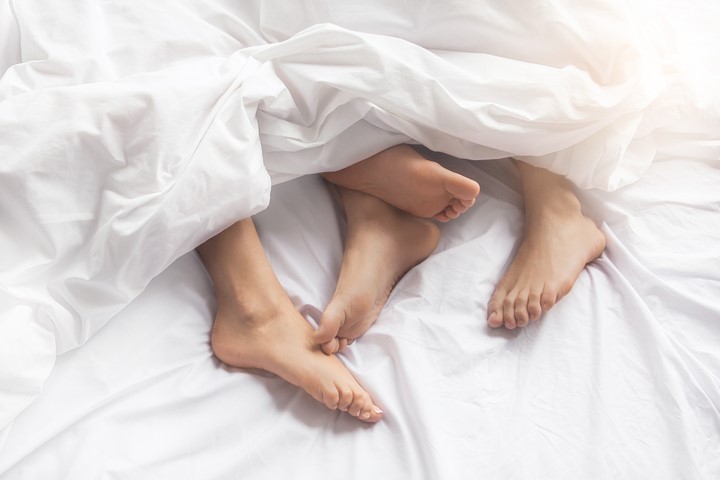Restless legs syndrome is a common condition, but it can be distressing and interrupt your sleep. Here's what you can do to help ease the symptoms.
🕒 5 min read
Restless legs syndrome (RLS) – or, to give it its official name, Willis-Ekbom disease (named after Karl Ekbom and Sir Thomas Willis, the doctors who first described it) – is a common condition affecting up to 10 per cent of people in Ireland.
As its name suggests, it causes an overwhelming urge to move your legs to get relief from often unbearable twitching and tingling.
Symptoms can vary from mild to severe; for some people they may be short-lived, for others they can last years, and then vanish completely.
Whatever the severity of the symptoms, sometimes a few minor lifestyle adjustments are all that is needed to manage the condition.
What are the symptoms of restless legs?
Unsurprisingly, the main symptom is the urgent and insistent need to move your legs, making you feel fidgety and restless.
Some people also experience an unusual 'crawling' or 'creeping' sensation in the feet, thighs and calves, while others have described it as like having a 'toothache in your leg'.
These symptoms tend to start when you are resting – particularly when sitting or lying down – and get worse in the evening or when you are in bed at night.
The arms can also be affected and, in some rare cases, the face. Another symptom, which affects over 80 per cent of those with RLS, is involuntary jerking of the legs (and/or arms) known as periodic limb movements in sleep (PLMS).
This can affect your sleep and potentially that of your partner, leading to extreme tiredness and fatigue. One study has suggested that the sleep-deprivation aspect of RLS can raise the risk of heart disease, particularly in older women.
The condition is known to affect twice as many women as men, and can certainly affect quality of life.
What causes restless legs syndrome?
Nobody really knows what causes it, although it does tend to have a genetic component and run in families.
Many experts have linked it to how the body handles dopamine – a brain chemical produced naturally in the body and involved in controlling muscle movement.
It is believed that dopamine could be one factor causing the involuntary leg movements associated with RLS. Others suggest that it's a condition related to poor circulation.
Being pregnant can put you more at risk, and one in five women will experience symptoms in the last three months of their pregnancy. Nobody knows exactly why, but it's suggested that this could be linked to low levels of iron.
RLS is also known to be a side-effect of taking some medicines, including certain antidepressants, beta-blockers, antihistamines and anti-psychotic medication.
Occasionally it is caused by an underlying health condition, such as iron deficiency anaemia or kidney failure.

The symptoms of RLS, which include the insistent need to move your legs, as well as involuntary limb jerking, can affect your sleep and the sleep of your partner.
Is there any treatment?
When you are having a restless leg episode, symptoms are generally eased in the short term by moving around the house, massaging the area or doing gentle calf stretches and/or circling your toes.
Some people find wearing compression socks helpful, while others find using a hot or cold compress on the affected area can ease the unpleasant feelings.
In the long term, there are a few simple lifestyle measures that can help.
- Getting into a regular sleep routine so you are going to bed and getting up at roughly the same time each day.
- Investing in a weighted or 'gravity' blanket. Some people with RLS say that lying under one of these blankets improves their symptoms. There is some research to show that weighted blankets ease anxiety, and RLS is likely to be exacerbated by stress and anxiety.
- Having a warm bath in the evening before bed.
- Avoiding caffeine and alcohol before bed, both of which can exacerbate or trigger symptoms.
- Exercising regularly but moderately (you don't want to work out to the point that your muscles are aching and painful, which will aggravate the condition, and try to avoid doing it too close to bedtime as this can stop you sleeping.) Yoga and stretching have been shown to be helpful exercises when reducing RLS symptoms.
- Acupuncture. A small 2015 study showed a reduction in RLS symptoms after a six-week course of acupuncture.
If your symptoms are not helped by any of the above, see your GP, who can review your medication to see if it is making the problem worse.
They can also check your iron levels and may prescribe supplements if yours are low.
Medication to regulate dopamine levels in the body, known as dopamine agonists, are often prescribed for more severe forms of RLS.
Magnesium. Magnesium is associated with muscle relaxation, and there is anecdotal evidence that it can help with symptoms. One study found that it improved insomnia caused by RLS.
Iron. Iron deficiency is thought to be one of the main causes of RLS, and taking supplements is often one of the first lines of treatment for the condition. Several studies have shown how this mineral can improve symptoms.
Vitamin D. Low levels of vitamin D have been linked to RLS. One study found that supplementing with vitamin D led to a reduction in RLS symptoms.
Folic acid. In one small study, researchers discovered that women with RLS were low in this nutrient and that taking folic acid supplements helped with their symptoms. It has also been suggested that folic acid helps to improve production of the neurotransmitter dopamine. Folic acid is a common part of a multivitamin.
Vitamin B12. A deficiency of this vitamin has been linked to RLS.

Magnesium 375mg
100% recommended daily amount of magnesium per tablet
- Reduces tiredness and fatigue
- Contributes to muscle and psychological function
- Helps maintain bones and teeth






